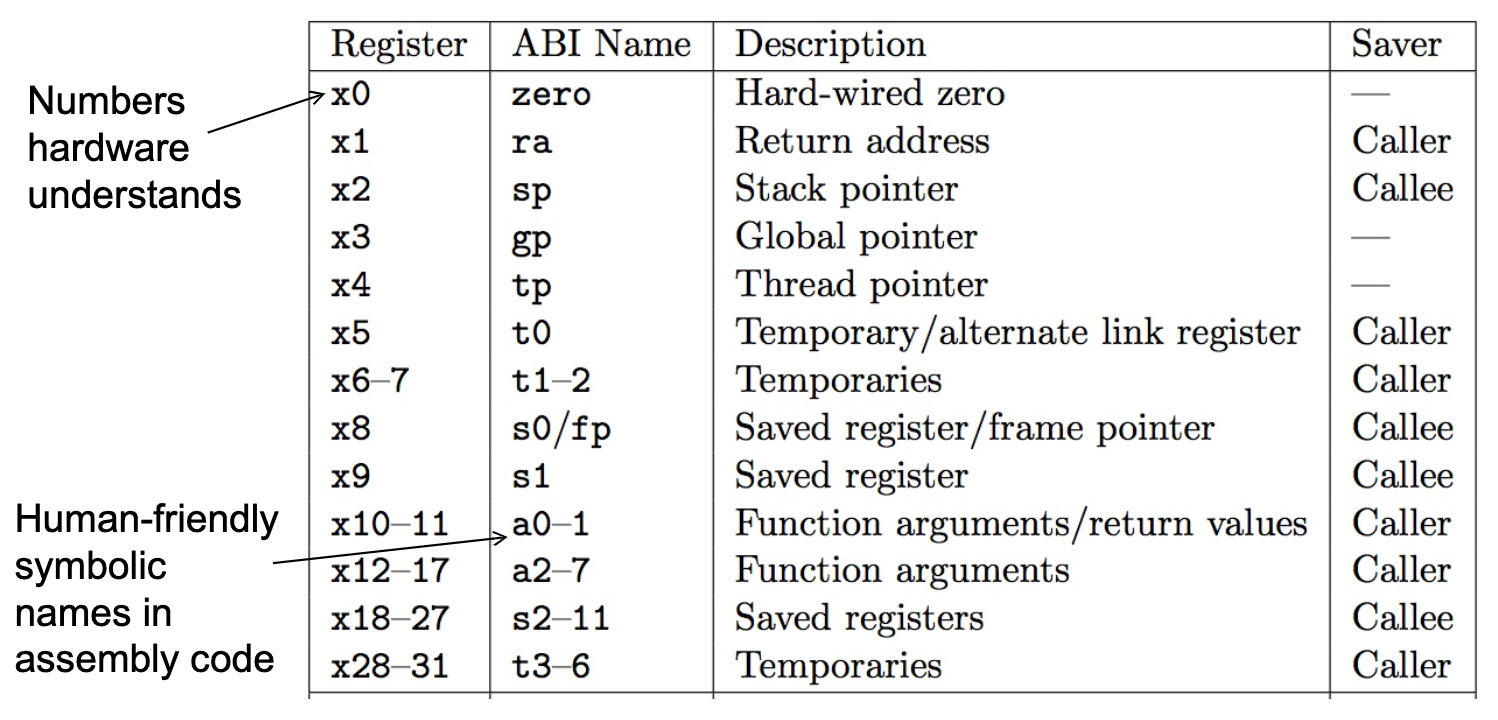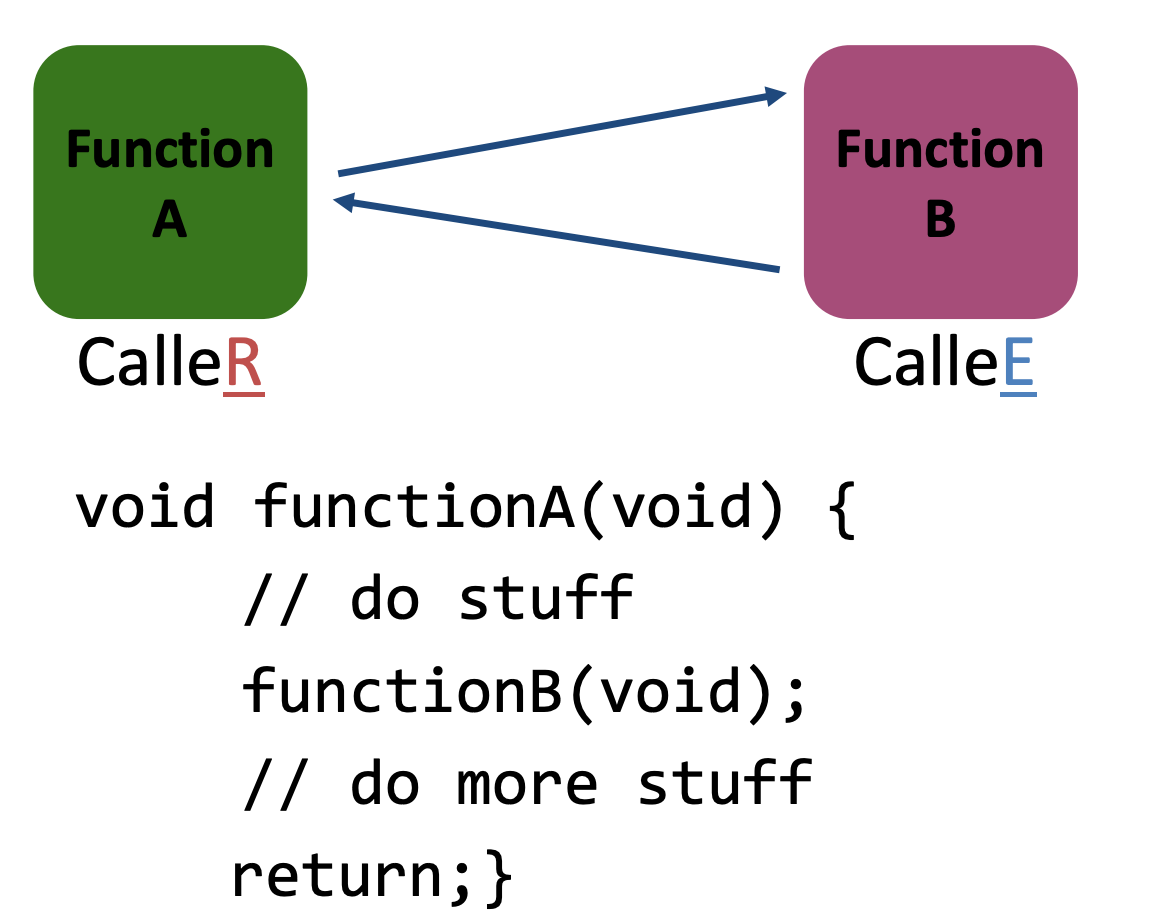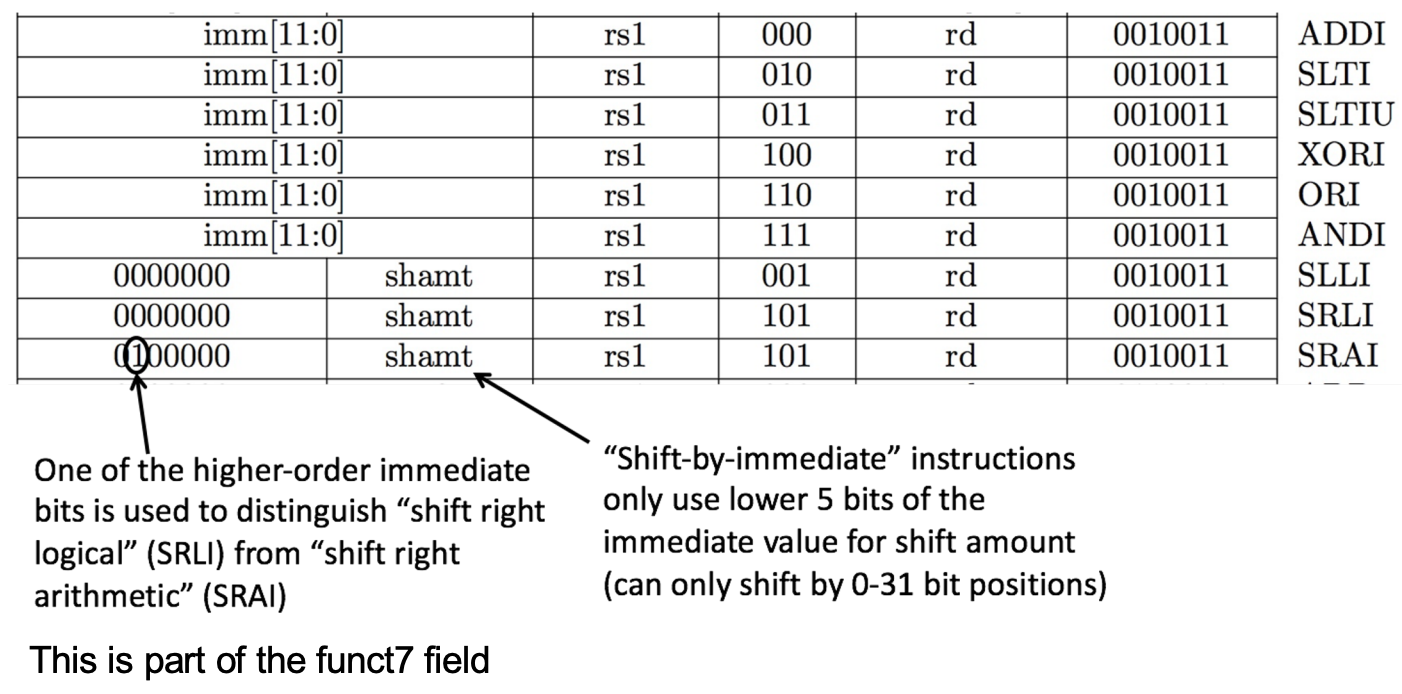2 RISCV Assembly
RISC-V Architecture
Register Size: 1 word = 32 bits = 4 bytes
32 registers:
x0(holds the value zero)-x31

Byte Ordering
Little Endian(x86, ARM)
Eg: 0x01234567

Sign Extend: Take the most-significant bit and copy it to the new bits
RISC-V Instructions
Assembly Syntax

no-op: an instruction that does nothing
add x0,x0,x0 # Writes to x0 are always ignored
Shifting Instructions
- When using immediate, only values 0-31 are practical
- When using variable, only lowest 5 bits are used (read as unsigned)
Data Transfer Instructions
sw/lw
Store word: M[R[rs1]+imm](31:0) = R[rs2](31:0)//rs1:transfer的结果
Load word: R[rd] = M[R[rs1]+imm](31:0)sb/lb
on sb, upper 24 bits are ignored
On lb, upper 24 bits are filled by sign-extension
Store Byte: M[R[rs1]+imm](7:0) = R[rs2](7:0)
Load Byte: R[rd] = {24’bM[](7), M[R[Rs1]+imm](7:0)}others
On sh, upper 16 bits are ignored
On lh, upper 16 bits are filled by sign-extension
On l(b/h)u, upper bits are filled by zero-extension
For e.g., s0 = 0x00000180 (all 32 bits)
lb s1,1(s0) # s1 = 0x00000001
lb s2,0(s0) # s2 = 0xFFFFFF80
sb s2,2(s0) # *(s0) = 0x00800180
常见错误
add x10,x11,4(x12) # 必须先lw再add
branches
- conditional branch
- branch if equal (beq) or branch if not equal (bne)
- branch if less than (blt) and branch if greater than or equal (bge)
- unconditional branch
j label # pseudo-code
jal dst label # Writes PC+4 to dst, set PC=lable
jalr dst src imm # Writes PC+4 to dst, set PC=src+imm
jr ra # pseudo-code:ret = jr ra = jalr x0, ra, 0
Example
C Loop Mapped to RISC-V Assembly
int A[20];
int sum = 0;
for (int i=0; i<20; i++)
sum += A[i];
# Assume x8 holds pointer to A
# Assign x10=sum
add x10, x0, x0 # sum=0
add x11, x0, x8 # Copy of A
addi x12,x11, 80 # x12=80 + A
loop:
lw x13, 0(x11)
add x10, x10, x13
addi x11, x11, 4
blt x11, x12, loop
Calling a function

Callee Saved(registers are expected to be the same before and after a function call)
- s0-s11 (saved registers)
- sp (stack pointer)
Caller Saved(These registers can be freely changed by the calleE,caller must save those values before making a procedure call)
- t0-t6 (temporary registers)
- a0-a7 (function arguments)
- ra (return address)
- because ra will change if calleE invokes another function
Choosing Your Registers
- Function does NOT call another function
- just use t0-t6 and there is nothing to save
- Function calls other functions
- Values you need throughout go in s0-s11, others go in t0-t6
Prologue:
addi sp,sp, -framesize
sw ra, <framesize-4>(sp) # 次二高,随后逐级递减
#store other callee saved registers
#save other regs if need be
Body:
Epilogue:
#restore other regs if need be
#restore other callee saved registers
lw ra, <framesize-4>(sp)
addi sp,sp, framesize
jr ra
E.g.
int sumSquare(int x, int y) {
return mult(x,x)+ y;
}
# Prologue
addi sp,sp,-8 # make space on stack
sw ra, 4(sp) # save ret addr
sw a1, 0(sp) # save y
add a1,a0,x0 # set 2nd mult arg
# Body
jal mult # call mult
# Epilogue
lw a1, 0(sp) # restore y
add a0,a0,a1 # ret val = mult(x,x)+y
lw ra, 4(sp) # get ret addr
addi sp,sp,8 # restore stack
jr ra
mult:
Instruction Format
| Type | 7 | 5 | 5 | 3 | 5 | 7 | comments |
|---|---|---|---|---|---|---|---|
| R | funct7 | rs2 | rs1 | funct3 | rd | opcode | add,xor,mul |
| I | imm[11:0] | rs1 | funct3 | rd | opcode | lw, jalr, slli | |
| S | imm[11:5] | rs2 | rs1 | funct3 | imm[4:0] | opcode | rs1--transfer的结果 |
| SB(Branch) | imm[12,10:5] | rs2 | rs1 | funct3 | imm[4:1, 11] | opcode | imm: lowest bit of offset is always zero |
| U | imm[31:12] | rd | opcode | lui,auipc | |||
| UJ | imm[20,10:1,11, 19:12] | rd | opcode | jal | |||
I format
12-bit immediate must be sign-extended to 32 bits

SB format
to = offset(byte)
U and UJ format
# Load Upper Immediate,clears the lower 12 bits
lui rd, immediate #rd = (immediate[31:12] << 12)
# Add Upper Immediate to PC
auipc rd, immediate #rd = pc+(immediate[31:12] << 12)
E.g. How to set 0xDEADBEEF?
# Wrong answer
lui x10, 0xDEADB # x10 = 0xDEADB000
addi x10, x10,0xEEF # if top bit of the 12-bit immediate is a 1, it will subtract -1 from upper 20 bits,thus x10 = 0xDEADAEEF
# Right
lui x10, 0xDEADC # x10 = 0xDEADC000
addi x10, x10,0xEEF # x10 = 0xDEADBEEF
# Call function at any 32-bit absolute address
lui x1, <hi 20 bits>
jalr ra, x1, <lo 12 bits>
# Jump PC-relative with 32-bit offset
auipc x1, <hi 20 bits>
jalr x0, x1, <lo 12 bits>